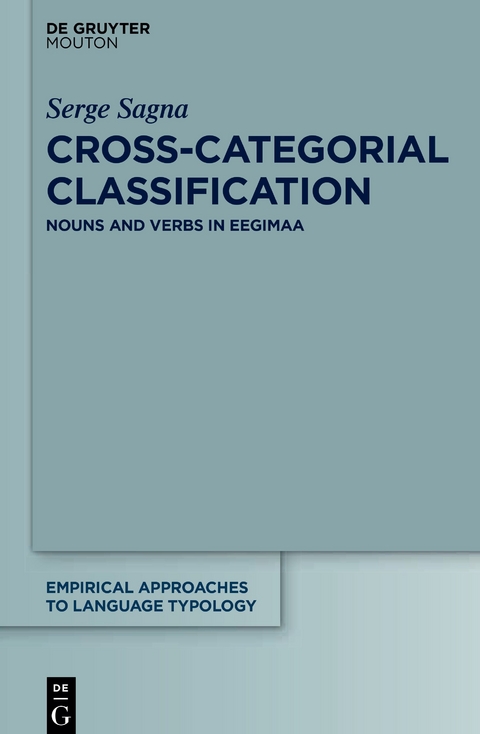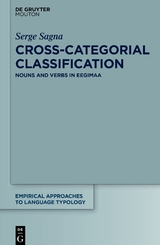Cross-Categorial Classification
Nouns and Verbs in Eegimaa
Seiten
2022
de Gruyter Mouton (Verlag)
978-3-11-059506-2 (ISBN)
de Gruyter Mouton (Verlag)
978-3-11-059506-2 (ISBN)
The series is a platform for contributions of all kinds to this rapidly developing field. General problems are studied from the perspective of individual languages, language families, language groups, or language samples. Conclusions are the result of a deepened study of empirical data. Special emphasis is given to little-known languages, whose analysis may shed new light on long-standing problems in general linguistics.
Languages in which non-finite verbs (infinitives, gerunds etc.) are classified using the same linguistic means as nouns are rare. This typologically unusual phenomenon is found in some Atlantic (Niger-Congo) languages, including Jóola languages like Eegimaa, Fogny and Kwatay, where several different noun class/gender prefixes (NCPs) are used to classify both nouns and verbs. In this book, it is argued following Sagna (2008), that these parallel morphosyntactic classifications in the nominal domain and verbal domains also reflect parallel semantic categorisation of entities and events. The main topics investigated in this book are word class flexibility between nouns and verbs, non-finiteness, noun class/gender (where morphological classes are analysed separately from agreement classes) and the semantic principles underlying the categorisation of entities and events. One of the central findings proposed in this book is that instances of NCP alternations on non-finite verbs reflect strategies of event delimitation. This book will be of interest to scholars investigating parts-of-speech systems, finiteness, systems of nominal and verbal classification, and linguistic categorization.
Languages in which non-finite verbs (infinitives, gerunds etc.) are classified using the same linguistic means as nouns are rare. This typologically unusual phenomenon is found in some Atlantic (Niger-Congo) languages, including Jóola languages like Eegimaa, Fogny and Kwatay, where several different noun class/gender prefixes (NCPs) are used to classify both nouns and verbs. In this book, it is argued following Sagna (2008), that these parallel morphosyntactic classifications in the nominal domain and verbal domains also reflect parallel semantic categorisation of entities and events. The main topics investigated in this book are word class flexibility between nouns and verbs, non-finiteness, noun class/gender (where morphological classes are analysed separately from agreement classes) and the semantic principles underlying the categorisation of entities and events. One of the central findings proposed in this book is that instances of NCP alternations on non-finite verbs reflect strategies of event delimitation. This book will be of interest to scholars investigating parts-of-speech systems, finiteness, systems of nominal and verbal classification, and linguistic categorization.
Serge Sagna, University of Surrey, UK
| Erscheinungsdatum | 05.03.2022 |
|---|---|
| Reihe/Serie | Empirical Approaches to Language Typology [EALT] ; 60 |
| Zusatzinfo | 7 b/w and 3 col. ill., 31 b/w tbl. |
| Verlagsort | Basel/Berlin/Boston |
| Sprache | englisch |
| Maße | 155 x 230 mm |
| Gewicht | 554 g |
| Themenwelt | Geisteswissenschaften ► Sprach- / Literaturwissenschaft ► Anglistik / Amerikanistik |
| Geisteswissenschaften ► Sprach- / Literaturwissenschaft ► Sprachwissenschaft | |
| Schlagworte | Afrcian Languages • African Languages • Afrikanische Sprachen • Atlantic Languages • Atlantische Sprachen • Banjal • Eegimaa |
| ISBN-10 | 3-11-059506-0 / 3110595060 |
| ISBN-13 | 978-3-11-059506-2 / 9783110595062 |
| Zustand | Neuware |
| Informationen gemäß Produktsicherheitsverordnung (GPSR) | |
| Haben Sie eine Frage zum Produkt? |
Mehr entdecken
aus dem Bereich
aus dem Bereich
Poetik eines sozialen Urteils
Buch | Hardcover (2023)
De Gruyter (Verlag)
59,95 €
Buch | Softcover (2024)
belleville (Verlag)
20,00 €




